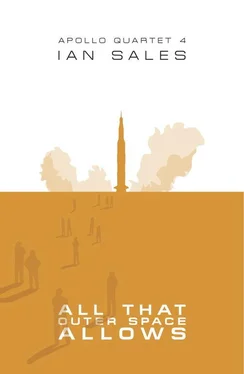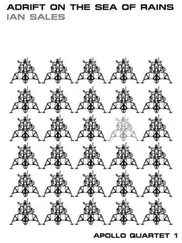Dodie, the Life journalist, she’s with the Schirras today, so they can talk freely. They can all smell a rat in the Eisele home, but everyone knows Togethersville has more than its fair share of rodents. Ginny listens with a fixed smile on her face and she wonders if her husband is as faithless as these women claim astronauts by nature are. What else, besides the training, the swagger, the constant broadcasting of the Right Stuff, must her husband do to get a shot at the Moon? And she worries how easy it would be for Walden to get himself into a situation where he never gets a flight.
Now that Walden is supporting Apollo 10, she sees less of him than ever. He spends most of the week at the Cape, and he doesn’t always fly home for the weekend. Has his behaviour changed? She can’t tell, she’s an Air Force wife, it’s always been like this. If there is a difference now—other than the quality of housing, and the fact they actually own the property—it’s this: whatever Walden is doing is in the public eye. No more military secrets. He can talk about it. He doesn’t, of course; not with Ginny. But she is still bent on her plan to learn more about Walden’s profession, the only thing putting a brake on it is his frequent absences.
Ginny drives home from the Cunningham house on automatic pilot. She knows about closed communities, she’s lived in them for most of her life, Air Force bases and, now she thinks about it, science fiction is much the same. Though her friends are scattered about the country, and they talk via letters and the occasional telephone call, they are all just as inward-looking, as cut-off from the real world, as Togethersville.
Ginny lives in two worlds, a high-heeled pump in each, and neither world seems much interested in reality. And though both exist for pretty much the same reason, the links between them are few and weak. When she goes shopping, and she sees those meagre handfuls of science fiction paperbacks in the book stores, with their gaudy covers featuring pretty women in spacesuits, piloting spaceships or exploring alien worlds; and then over by the magazines, there’s Life , with a Saturn V on a pillar of flame arrowing across the cover.
Are the two really so far apart?
Back at the house, Ginny kicks off her shoes, in the bedroom she strips down to her panties and bra and then, almost reverently, takes her slacks and plaid shirt from the chest of drawers. She sits on the double-bed she shares these days with Walden only on occasional weekends, and gazes down at the folded garments in her lap. It’s been nearly eighteen months since she wrote ‘The Spaceships Men Don’t See’ and though she tells herself she’s been too busy to write in the months since, she knows she’s blocked. She can’t tell her friends, she can’t mention it in her letters to Ursula, Ali, Judith, Joanna… It’s a confession too far, if there’s one thing the AWC has taught her it’s that you only open up so much—hell, if there’s one thing marriage has taught her, it’s that some things need to remain secrets.
The truth is, she’s been meaning to make good on her epiphany in the lunar module simulator eight months ago, but every time she sneaks a look at one of Walden’s training manuals the scale of the task she has set herself overwhelms her. So she goes and cleans the bathroom. Or she calls up Mary or Louise or Dotty. Or she does a million and one other things that are not writing science fiction or trying to learn how an Apollo spacecraft functions. She has been co-opted, assimilated: she has become an astronaut wife .
It’s not how Ginny sees herself, not inside, it’s a part she has been playing, that’s all. These slacks, this plaid shirt, they’re the real Virginia Grace Eckhardt née Parker. It was so easy to be her, back in those days at Edwards, of ceramic blue skies and desert heat and that fine layer of dust which settled on every surface, living miles from anywhere; science fiction was a lifeline, one she clung to with a desperation born of despair. But, oh, how easily she has been corrupted by this new life gifted her by NASA, by that shining beacon in the night sky—which, for the first time in the history of Man, it’s become possible to visit.
Ginny dresses quickly, almost feverishly. She gets an old pair of sandals out of the closet. She fetches her Hermes Baby, and a stack of typing paper, from her dressing-room, and carries them reverently into the lounge. It is late afternoon, she has a lonely evening stretching ahead of her, normally she’d make herself a salad or something light and then curl up in front of the television, maybe with a magazine to read.
Not tonight. She makes herself a scotch, with plenty of water, not the iced tea which used to fuel her when she was writing, and she sits at the table and holds her hands in readiness over the keys—
Something about going to the Moon, she’s going to write a story about a mission to the Moon. And she’s going to make it accurate and full of realistic detail, a new sort of science fiction, rigorous and backed up by real science and engineering.
A cynical reader might observe Ginny’s evolving relationship to science fiction, and it’s not the science fiction we know, as illustrated by the names of the published writers, all of which are real science fiction authors, which have been mentioned in this novel—Ginny’s changing thoughts and dreams on, and of, the genre, as influenced by her husband’s new career, by this great new adventure the USA is undertaking, recapitulate this quartet’s relationship to science fiction. It would be disingenuous to claim this is happenstance—Ginny is a fictional construct and her life created toward a particular end. And a particular resolution. But there is a wider point to make here: “motif” and “theme” are synonyms for “pattern”, and human beings are predisposed to find patterns, even where they do not exist. It takes little to suggest a higher purpose at work—some carefully-placed hints, an element of serendipity, an insistence that some of the topics explored by literature are universal…
Ginny has learnt for herself that “universal” is not quite so all-encompassing a term the dictionary definition claims. Critical studies of science fiction are almost non-existent: perhaps some Lit student somewhere has written a thesis on the fiction of Margaret St Clair or Alice Norton, but Ginny does not know of any. Science fiction is genre fiction, women’s fiction, not deemed worthy of study. And men control the literature departments of American universities, Ginny knows this for herself (nothing has changed since she graduated). Male professors are not interested in fiction read and written by women.
And yet… Ginny looks down at her hands poised over the typewriter keys, and considers what she is about to do. She is going to take an endeavour which has been presented to the world as the very pinnacle of male achievement—for all of Betty Skelton’s accomplishments, it is only men who have the “Right Stuff”—and she is going to colonise, no, occupy it, in the name of women. She is going to take from men something they have quite deliberately kept for themselves—and it is by no means the only such thing—and she is going to re-invent it for her gender…
The audacity of her plan intimidates her.
#


#
Ginny’s empty promise earlier in the year proves prophetic when Walden is chosen for the Apollo 12 backup crew by Dave Scott. The rotation schedule means he will get to fly on Apollo 15—David Scott, Commander; Alfred Worden, Command Module Pilot; Walden Eckhardt, Lunar Module Pilot. An all Air Force crew—not just their friend and neighbour back in California, Al; but Dave was also at Edwards when he was selected by NASA in 1963 (the Eckhardts knew of him back then but they did not socialise).
Читать дальше














